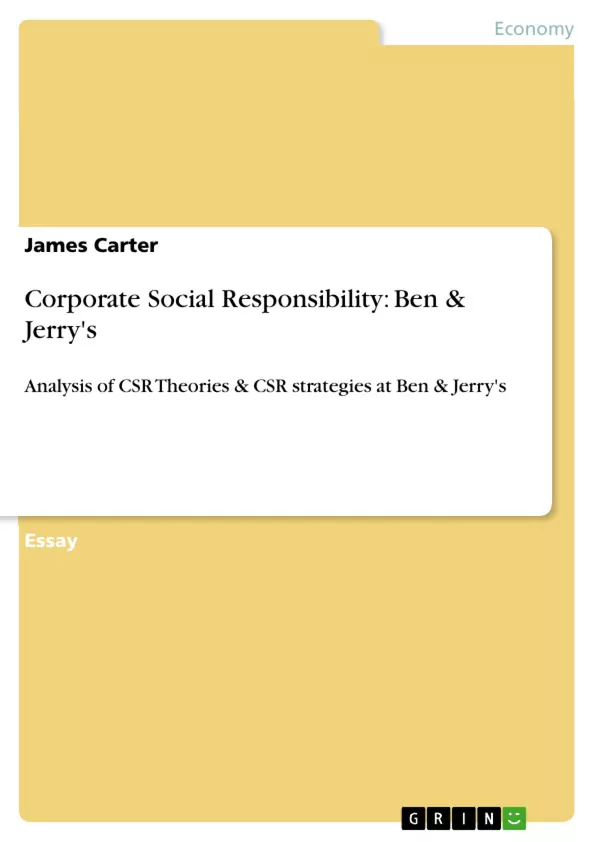This paper examines three key corporate social responsibility (CSR) issues Ben & Jerry’s faces and critically evaluates the nature and degree of the company’s responsibilities in relation to each issue. Ben & Jerry’s response to each issue will be analysed, and critically evaluated based on CSR theories and evidenced the behaviour of the company. Finally, recommendations are proposed as to how Ben & Jerry’s can overcome these issues.
Table of Contents
- Introduction
- Ben & Jerry's CSR Challenges
- Challenge 1: Maintaining Founding Beliefs Post-Acquisition
- Challenge 2: Balancing Activism and Profit
- Challenge 3: Environmental Protection and Global Expansion
- Analysis of Challenges and CSR Theories
Objectives and Key Themes
This paper aims to analyze three key corporate social responsibility (CSR) challenges faced by Ben & Jerry's, evaluating the company's responses in light of relevant CSR theories. The analysis will assess the effectiveness of Ben & Jerry's strategies and offer recommendations for improvement.
- The impact of Unilever's acquisition on Ben & Jerry's CSR initiatives.
- The tension between profit maximization and the pursuit of social and environmental goals.
- The application of various CSR theories (stakeholder salience, corporate constitutionalism, instrumental theory, integrative social contract theory) to Ben & Jerry's practices.
- The challenges of balancing environmental responsibility with global expansion and profitability.
- The role of corporate power in influencing social good.
Chapter Summaries
Introduction: This introductory section provides background on Ben & Jerry's history as a pioneer in corporate social responsibility (CSR) and establishes the three main CSR challenges the paper will examine: maintaining founding beliefs post-Unilever acquisition; balancing activism and profit; and reconciling environmental protection with global expansion.
Ben & Jerry's CSR Challenges: This section details the three core challenges faced by Ben & Jerry's. The first involves the potential dilution of their original socially conscious mission following the 2000 acquisition by Unilever. The second explores the inherent conflict between maximizing profits and adhering to their commitment to social and environmental causes. The third focuses on the difficulties in maintaining environmentally responsible practices while pursuing international growth and profitability. These challenges are framed within the context of Ben & Jerry's three core missions: social, product, and economic.
Analysis of Challenges and CSR Theories: This section delves into a critical analysis of the identified challenges, employing various CSR theories to provide a framework for understanding Ben & Jerry's actions and their implications. Stakeholder salience theory is used to examine the impact of Unilever's acquisition on stakeholder influence. The tension between profit maximization (as advocated by Friedman) and the pursuit of social good (consistent with Aristotelian traditions and corporate constitutionalism) is explored. Finally, the chapter investigates the applicability of integrative social contract theory to address Ben & Jerry's environmental responsibilities in the context of global expansion. The chapter compares and contrasts different CSR motivational approaches, including altruistic, egotistic, and strategic motives, and their implications for Ben & Jerry's actions.
Keywords
Corporate Social Responsibility (CSR), Ben & Jerry's, Unilever, Stakeholder Salience Theory, Instrumental Theory, Integrative Social Contract Theory, Profit Maximization, Social Activism, Environmental Sustainability, Corporate Constitutionalism, Global Expansion, Philanthropy.
Ben & Jerry's CSR Challenges: Frequently Asked Questions
What is the main focus of this document?
This document provides a comprehensive overview of a paper analyzing three key corporate social responsibility (CSR) challenges faced by Ben & Jerry's. It includes a table of contents, objectives, key themes, chapter summaries, and keywords.
What are the three main CSR challenges discussed?
The paper focuses on: 1) Maintaining founding beliefs post-Unilever acquisition; 2) Balancing activism and profit; and 3) Reconciling environmental protection with global expansion.
How does the document analyze Ben & Jerry's challenges?
The analysis uses various CSR theories, such as stakeholder salience theory, instrumental theory, and integrative social contract theory, to understand Ben & Jerry's actions and their implications. It examines the impact of Unilever's acquisition, the tension between profit and social goals, and the challenges of balancing environmental responsibility with global growth.
What CSR theories are applied in the analysis?
The analysis incorporates Stakeholder Salience Theory, Instrumental Theory, Integrative Social Contract Theory, and considers the contrasting views of profit maximization (Friedman) and the pursuit of social good (Aristotelian traditions and corporate constitutionalism).
What is the impact of Unilever's acquisition on Ben & Jerry's discussed?
The paper explores the potential dilution of Ben & Jerry's original socially conscious mission following its acquisition by Unilever, analyzing the impact on stakeholder influence and the company's ability to maintain its commitment to social and environmental causes.
How does the paper address the tension between profit and social responsibility?
The document examines the inherent conflict between maximizing profits and adhering to Ben & Jerry's commitment to social and environmental goals, exploring different CSR motivational approaches (altruistic, egotistic, and strategic).
What are the environmental challenges faced by Ben & Jerry's?
The paper investigates the difficulties Ben & Jerry's faces in maintaining environmentally responsible practices while pursuing international growth and profitability, particularly in light of integrative social contract theory.
What is the role of corporate power in the analysis?
The analysis considers the role of corporate power in influencing social good, particularly within the context of a large multinational corporation like Unilever acquiring a smaller, socially conscious company like Ben & Jerry's.
What are the key takeaways from the chapter summaries?
The introduction sets the stage, the main body details the three core challenges with supporting evidence and theory, and the final section provides a critical analysis using various CSR theoretical frameworks. The analysis aims to assess the effectiveness of Ben & Jerry's strategies and offer recommendations for improvement.
What are the keywords associated with this analysis?
Key words include Corporate Social Responsibility (CSR), Ben & Jerry's, Unilever, Stakeholder Salience Theory, Instrumental Theory, Integrative Social Contract Theory, Profit Maximization, Social Activism, Environmental Sustainability, Corporate Constitutionalism, Global Expansion, and Philanthropy.
- Quote paper
- Student James Carter (Author), 2013, Corporate Social Responsibility: Ben & Jerry's, Munich, GRIN Verlag, https://www.grin.com/document/213734



